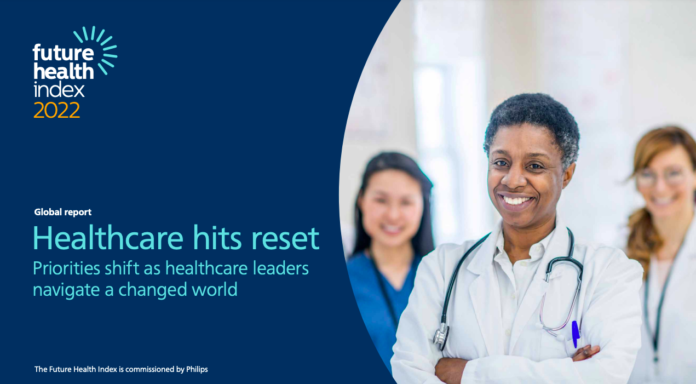Healthcare leaders across the Asia-Pacific region are looking to data and predictive technologies as essential foundations of their future healthcare systems, yet significant challenges in realising this ambition abound.
This is from the latest the Future Health Index 2022 report from Royal Philips, which is based on a survey of almost 3,000 respondents across 15 countries, including Singapore.
Caroline Clarke, CEO & EVP of Philips ASEAN Pacific, said that after a tough two years, APAC’s healthcare leaders are ahead of the curve when it comes to championing these new technologies. However, significant challenges remain.
“Ultimately, the value of data and technology is only as strong as the human experience it supports, and it’s vital that our approach to digital transformation is centered around people,” said Clarke.
“To that end, overcoming data silos and supporting staff training and education are urgently needed to ensure that these ambitions, including improving staff retention can be fulfilled and the region’s desired health outcomes are achieved,” she added.
APAC’s healthcare leaders are global front runners when it comes to recognising the benefits of data to their organisations, with 82% of leaders agreeing that the value of data to their facility is worth the time and resources invested. This places them on a par with the United States and significantly ahead of the global (65%) and European (60%) averages.
Notably, Singapore’s healthcare system is ahead of other global counterparts (65%) in its appreciation of the value of data (91%), with Indonesia (82%) and Australia (75%) also holding it in high regard.
Confidence in data usage is also high in APAC, with the majority of healthcare leaders saying that they can extract actionable insights from the available data (85%), have access to the necessary technology (84%) to use data, and believe in the high level of data accuracy in their facilities (82%).
The APAC countries are also aligned in recognising the importance of investing into AI and predictive analytics within the next three years, with 55% of respondents already investing heavily in AI, while 82% predict it will become a top investment area within the next three years.
The index also sees health systems in APAC using predictive analytics in some capacity. More than a quarter (27%) of their hospitals or healthcare facilities have already adopted the technology, while nearly half (44%) are currently in the process of doing so, above the global average of 32%.
However, significant areas of improvement remain in realising the ambition of using data, AI and predictive analytics as key enablers of future healthcare systems.
In clinical settings specifically, 41% of APAC leaders are sharing data with third-party organizations, 40% are using data for predictive analytics, 30% are collecting and storing data, and 28% are using data to automate tasks.
Nearly three quarters (73%) of APAC’s healthcare leaders cite data silos as hindering their ability to use data effectively, far above the global average of 51%. Other hurdles such as technical infrastructure limitations (23%), data privacy and security concerns (21%), data policy and regulations (21%).
Workforce resistance, skills and knowledge gaps also rank highly as another barrier to data use in APAC (35%). Nearly three quarters (74%) of the region’s healthcare leaders say their staff are overwhelmed by the volume of data available today, significantly higher than the global average of 55%.
















